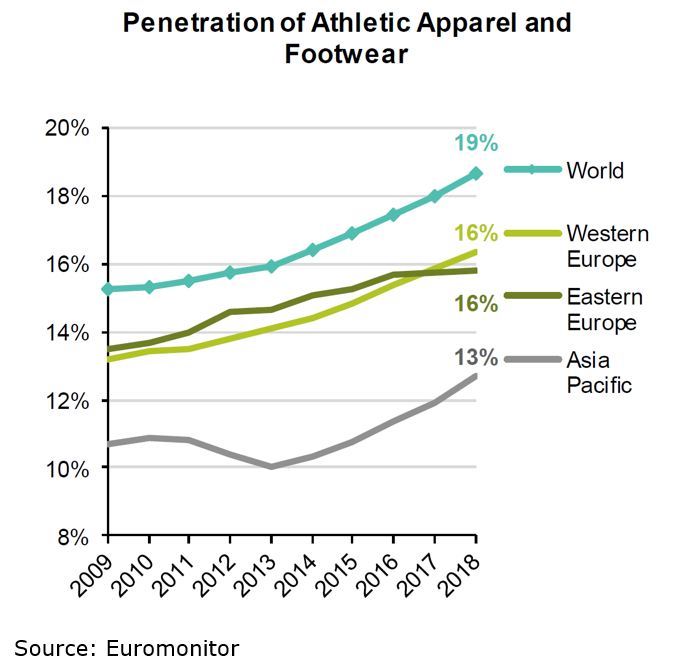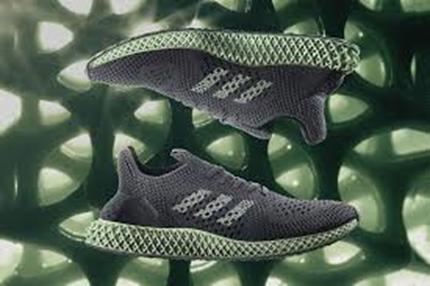Adidas – Benefitting from the collision of the Athleisure and 3D Printing Global Megatrends
The health and wellness industry is estimated to be in excess of 4 trillion dollar industry that will continue to drive the global economy for the next 30 years or more. Wellness has become mainstream and it is greatly influencing consumers buying and decision-making process.
The health and wellness industry is estimated to be in excess of 4 trillion dollar industry that will continue to drive the global economy for the next 30 years or more. Wellness has become mainstream and it is greatly influencing consumers buying and decision-making process. The Wellness market spans across generations and consumer demographics. It is anyone and everyone who wants to be healthy, happy, look good, stay engaged, productive and active. This is driving up the Athleisure category with increasing numbers of consumers across all ages being drawn to athleisure apparel every passing year.
This growth can be seen in the chart below where the athletic apparel and footwear category has gained 8% points share, from 23% of the North American apparel & footwear market in 2009 to 31% in 2018. The significant opportunity sits outside of North America where global penetration is currently much lower at 19% of the market. Sportswear benefits from consumers increasingly seeking to convey their healthy lifestyles, and public policies in key markets, such as the Chinese national programme to develop the domestic sports economy.

The most innovative company in Europe, clocking in at number 10 in the BCG global rankings is Adidas, marking a stunning move up the leaderboard from 35th place the year before. You can begin to see why Adidas does well on this list when relative to a weighting of 5% of group sales in 2017, its E-commerce division grew 36% and contributed circa 2% (or one entire quarter) of the Adidas group top line growth in 2018.
An example of the strength of its innovation focus can be seen in how it is making it a priority to improve running performance by creating shoes with variable properties across the midsole. It resulted in the launch of Futurecraft 4D together with 3D printing company Carbon (and its Digital Light Synthesis technology). The company is actually paving the way for customised shoes that fit the unique contours of every single customer’s foot.
This new printing process is a lot faster and more effective than the traditional 3D-printing process. For example, 3D printing soles used to take Adidas 10 hours vs. 90 minutes now with Carbon. Adidas introduced 5,000 pairs of its first 3D-printed shoe it mass-produced (Futurecraft 4D) in January 2018 and released another 100,000 by the end of 2018 (at a price of $300 per pair). And Adidas will have access to enough printers from Carbon to make over a million pairs in 2019.

Carbon’s proprietary technology, Continuous Liquid Interface Production or CLIP, provides some major advantages over traditional 3D printing methods. Rather than creating parts in discrete layers, CLIP allows for parts to be formed in a continuous process, drastically reducing build time while improving the quality of the printed parts.
Adidas has multiple qualities that points to it being successful in a rapidly changing and highly disruptive retail environment. It is capable of creating a product with wide ranging appeal, tapping into new demand in emerging markets such as China, growing faster than wider apparel and footwear spending in mature developed markets like Western Europe and scaling e-commerce (from zero to €1.5bn of sales in ten years). This expertise, overlaid on the persistent premium growth of spend on sportswear and related categories, and the shift toward direct-to consumer mean we expect sales growth at Adidas in excess of global GDP in the years ahead. This should translate into higher margins and returns on invested capital.
For more information on Adidas and other Megatrends, please visit Insync Funds Managers’ Website here.
EQT Responsible Entity Services Limited (“EQT”) (ABN 94 101 103 011), AFSL 223271, is the Responsible Entity for the Insync Global Quality Equity Fund and the Insync Global Capital Aware Fund. EQT is a subsidiary of EQT Holdings Limited (ABN 22 607 797 615), a publicly listed company on the Australian Securities Exchange (ASX: EQT). This information has been prepared by Insync Funds Management Pty Ltd (ABN 29 125 092 677, AFSL 322891) (“Insync”), to provide you with general information only. In preparing this information, we did not take into account the investment objectives, financial situation or particular needs of any particular person. It is not intended to take the place of professional advice and you should not take action on specific issues in reliance on this information. Neither Insync, EQT nor any of its related parties, their employees or directors, provide and warranty of accuracy or reliability in relation to such information or accepts any liability to any person who relies on it. Past performance should not be taken as an indicator of future performance. You should obtain a copy of the Product Disclosure Statement before making a decision about whether to invest in this product.
General Advice Warning
Any advice provided by Reach Markets including on its website and by its representatives is general advice only and does not consider your objectives, financial situation or needs, and you should consider whether it's appropriate for you. This might mean that you need to seek personal advice from a representative authorised to provide personal advice. If you are thinking about acquiring a financial product, you should consider our Financial Services Guide (FSG) including the Privacy Statement and any relevant Product Disclosure Statement or Prospectus (if one is available) to understand the features, risks and returns associated with the investment.
Please click here to read our full warning.
